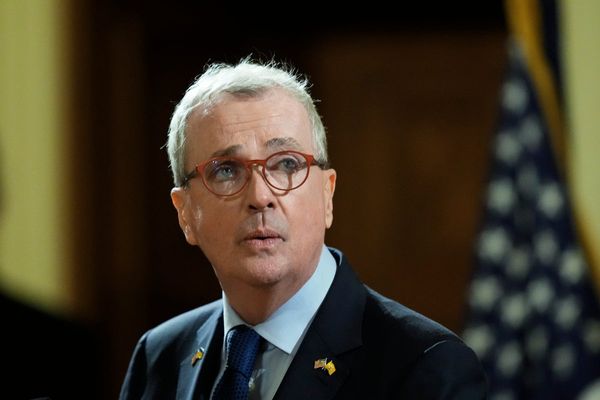
Joe Biden has given his starkest warning yet that Republicans are playing directly into the hands of the Russian president, Vladimir Putin, by threatening to end military aid to Ukraine.
“Russian loyalists in Moscow celebrated when Republicans voted to block Ukraine’s aid last week,” the US president said at a joint press conference with the Ukrainian leader, Volodymyr Zelenskiy, in Washington on Tuesday. “The host of a Kremlin-run show said: ‘Well done Republicans, that’s good for us.’”
Biden added: “If you’re being celebrated by Russian propagandists, it might be time to rethink what you are doing. History will judge harshly those who turned their back on freedom’s cause.”
It was the Ukrainian president’s warmest welcome of the day. Earlier, on Capitol Hill, he had struggled to persuade Republicans to support a $61bn military aid package, with objectors insisting on White House concessions on border security as a condition for a deal.
Zelenskiy addressed members of the Senate in a closed 90-minute meeting on Tuesday morning, but afterwards, key Republicans repeated that they wanted to see a crackdown on immigration between the US and Mexico in return for supporting the package.
But later, in a room crammed with reporters, Biden announced an additional $200m military aid package and, amid concerns that the war had reached a stalemate, insisted that Ukraine had made significant progress. “I will not walk away from Ukraine, and neither will the American people,” Biden said.
He also sharply condemned the Republican negotiating tactic. “Putin is banking on the United States failing to deliver for Ukraine,” he said. “We must, we must, we must prove him wrong … Holding Ukraine funding hostage in an attempt to force through an extreme Republican partisan agenda on the border is not how it works. We need real solutions.”
Zelenskiy, making his third visit to Washington since the war broke out in February 2022, said he was encouraged by his meetings with members of Congress. He told reporters: “I got the signals. They were more than positive. But we know that we have to separate words and particular results. Therefore we will count on particular results.”
Senate Republicans last week blocked an emergency aid package primarily for Ukraine and Israel after conservatives complained about the exclusion of immigration policy changes they had demanded as part of the package.
Zelenskiy, who last winter received a hero’s welcome on Capitol Hill, found less enthusiasm this time. He sought to reassure senators concerned about whether US military aid would be wasted because of corruption, Mike Rounds, a Republican, told CNN, and that Ukraine needed more air defence systems to support its counteroffensives.
Senior Democrats, meanwhile, expressed frustration with the lack of progress. Chuck Schumer, the Democratic Senate leader, said: “The one person happiest right now about the gridlock in Congress is Vladimir Putin. He is delighting in the fact that Donald Trump’s border policies are sabotaging military aid to Ukraine.”
The Ukrainian president moved on to a meeting with Hakeem Jeffries, the Democratic House minority leader, and after that to a meeting with the recently elected Republican speaker of the House, Mike Johnson, who has been relatively sceptical about further financial support for Ukraine.
After their meeting, Johnson complained that the White House was asking Congress to approve the spending of billions of dollars “with no appropriate oversight, without a clear strategy to win”.
Johnson added that “our first condition on any national security supplemental spending package is about our own national security first” but he also insisted that the US did stand with Zelenskiy “against Putin’s brutal invasion”.
Zelenskiy posted a picture on X, formerly Twitter, of him addressing senators, saying he had had “a friendly and candid conversation”. He emphasised the importance of US military aid in his country’s fight against Russia.
Moscow said it was watching developments closely. Dmitry Peskov, the Kremlin spokesperson, said that “tens of billions of dollars” already provided by Washington had failed to turn the tide of war and that more money would make little difference. Zelenskiy’s authority was being undermined by the failures, he added.
Congress is due to break for the year on Friday and there appeared little prospect of a breakthrough that would allow a funding package to be passed before then – meaning that negotiations will have to pick up in the new year at a time when the amounts available to Ukraine are running short.
Last week, Shalanda Young, the director of the White House’s office of management and budget, said that the Pentagon had used up 97% of the $62.3bn in Ukraine allocations previously authorised by Congress, while the state department had none of its $4.7bn remaining.
Adrienne Watson, the spokesperson for the White House national security council, said Russia believes that “a military deadlock through the winter will drain western support for Ukraine”, ultimately handing Moscow the advantage.
Newly declassified US intelligence concluded that the war had cost Russia 315,000 dead and injured troops, amounting to nearly 90% of the personnel it had had before the war started in February 2022.
In Ukraine, the country’s biggest mobile phone network, Kyivstar, was badly hit on Tuesday by what appeared to be the largest cyber-attack of the war with Russia so far. Phone signals, the internet and some of the Kyiv region’s air alert system were knocked out, in an attack that the company’s chief executive said was “a result of” the war.
Ukrainian sources indicated that the attack had not been financially motivated, but rather destructive in nature, and it was unclear who precisely was responsible. The country’s SBU intelligence service said it was investigating whether the attack had been directed by one of Russia’s intelligence agencies.







